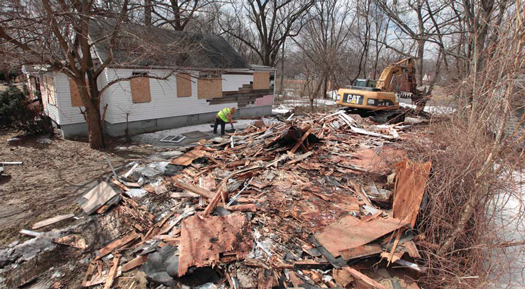Detroit debts, assets focus of trial
By AP | Last updated: Sep 12, 2014 - 8:09:30 AMWhat's your opinion on this article?

An excavator tears down a house in Detroit’s Brightmoor area. For years, Brightmoor area residents pleaded with the city to demolish vacant homes that scavengers have stripped of wiring and plumbing and anything of value. Some structures are already gone, and now offi cials aim to do much more, possibly tearing down as many as 450 empty houses each week across more than 20 square miles of the city—a vast patchwork of rotting homes comparable to the size of Manhattan. Photo: AP/Wide World photos
|
DETROIT - Detroit’s chief financial officer acknowledged Sept. 4 that officials may have to make “adjustments” to a plan aimed at reducing the bankrupt city’s debt if future revenues come in lower than projected.
John Hill Jr. was the first witness called during a trial that began the first week of September, where a federal judge is weighing whether to approve the city’s long-term plan to get out of bankruptcy.
Detroit is trying to cut its unsecured debt from $12 billion to $5 billion in a plan that most creditors, including more than 30,000 retirees and city employees, have endorsed.
As part of that effort, officials say the city needs $1.7 billion over the next decade for reinvestment, to tear down vacant houses and improve police, fire and other services. The city plans to borrow $200 million and is proposing $1.5 billion in spending cuts or revenue increases, such as selling off city assets, outsourcing some services and collecting unpaid property taxes.
Under questioning from a lawyer representing the city, Mr. Hill acknowledged there may have to be some changes in the plan if revenues fall short, but didn’t go into specifics.
An attorney representing one of the city’s creditors cited a report that an estimated $130 million in property taxes go uncollected in Detroit. Mr. Hill responded under cross-examination that collection rates are “starting to creep up.” He also said the city’s property tax rate is at its maximum and only can be raised by an act of the Legislature.
The bankruptcy trial started Sept. 2 with opening statements. Bond insurers Syncora Guarantee and Financial Guaranty Insurance Co. are leading a small group of creditors fighting the approval of the plan crafted by state-appointed emergency manager Kevyn Orr and his restructuring team.
They say Mr. Orr is treating pensioners better than financial creditors. Syncora has said Detroit wants to pay pennies on the dollar for its claim of about $400 million. An attorney for Financial Guaranty Insurance said Sept. 3 that its claim is about $1 billion.
Mr. Orr’s plan calls for the city’s general retirees to take a 4.5 percent pension cut and lose annual inflation adjustments. Retired police officers and firefighters would lose a portion of their annual cost-of-living raise.
Cuts to retirees would be steeper if not for a commitment of more than $800 million over 20 years from the state, major corporations, foundations and others.
In July 2013, Mr. Orr made Detroit the largest U.S. city to file for bankruptcy. Federal Judge Steven Rhodes approved the bankruptcy petition in December.
Mr. Hill was hired in November 2013. He testified Sept. 4 that the office had trouble keeping track of how much money was coming in and going out before he took the job. A computer system designed to track the city’s finances had not been fully implemented, Mr. Hill said.
Detroit’s internal controls over financial reporting were “very, very poor,” he added.
INSIDE STORIES AND REVIEWS
-
-
About Harriett ... and the Negro Hollywood Road Show
By Rabiah Muhammad, Guest Columnist » Full Story -
Skepticism greets Jay-Z, NFL talk of inspiring change
By Bryan 18X Crawford and Richard B. Muhammad The Final Call Newspaper @TheFinalCall » Full Story -
The painful problem of Black girls and suicide
By Charlene Muhammad -National Correspondent- » Full Story -
Exploitation of Innocence - Report: Perceptions, policies hurting Black girls
By Charlene Muhammad -National Correspondent- » Full Story -
Big Ballin: Big ideas fuel a father’s Big Baller Brand and brash business sense
By Bryan Crawford -Contributing Writer- » Full Story






 Click Here Stay Connected!
Click Here Stay Connected!








